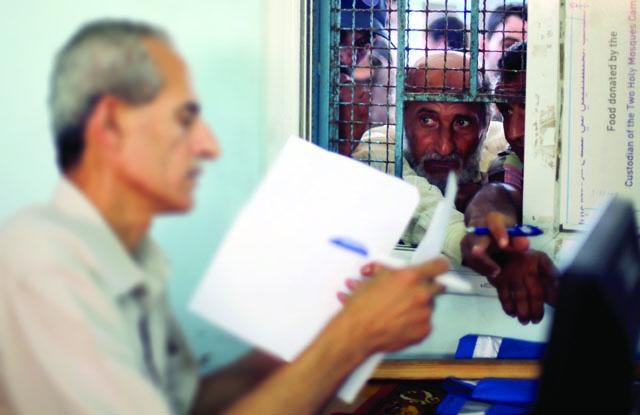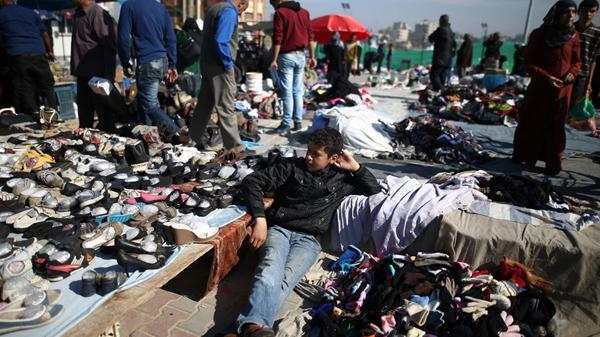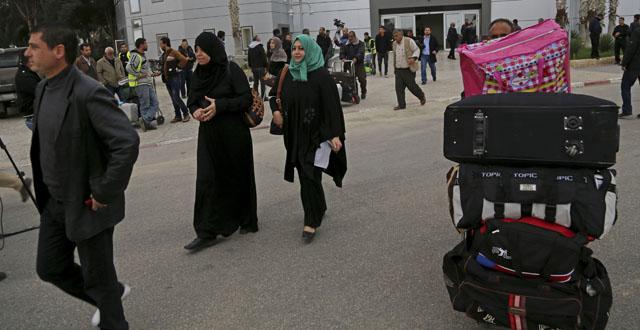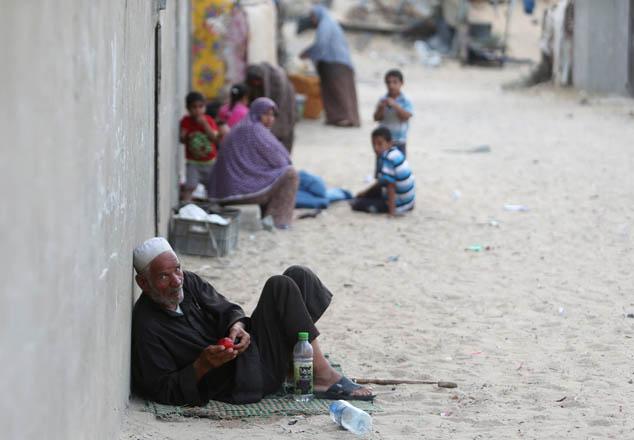You are here
Gazans struggle with rising prices
By AFP - Aug 11,2014 - Last updated at Aug 11,2014

GAZA CITY, Palestinian Territories — Israeli bombardment has left parts of Gaza in ruins and the enclave's already shattered economy is also feeling the pinch as prices for staple foods have started to climb.
The market in Gaza City's Shati refugee camp was bustling this week, but many of the camp's hard-up residents are buying less.
Israel's offensive on the enclave has hit agricultural areas badly, pushing up prices.
Khaled Ighrad, 48, who was buying food with his wife and one of his six children, has had to cut back on some key items for his family.
The price of eggs has doubled from 10 shekels (two euros, $3) to 20 since Israel launched a campaign of air strikes on July 8.
"I'm not buying a whole box of eggs, I'm buying half. I'll buy this and it lasts us for two days," he said, wistfully looking at the trays of eggs on the stall in front of him.
"Prices have gone up because things like meat and eggs are produced on the border area. We don't go to the border area any more, so the people only went during the ceasefire," he added.
Israel expanded its offensive against Hamas into a ground operation in mid-July, pushing troops, tanks and artillery across the border into the narrow enclave.
Grown in Gaza
A few stalls away, under a coloured canvas awning, Abu Ahmed Badawi sits next to tables stacked with peppers, onions, tomatoes and potatoes. Few people stop to ask about his wares, grown in Gaza, since he has had to raise his prices.
Not only are farmers unwilling to tend their crops because of the risk of air strikes or shelling, or Hamas rocket attacks falling short, but drivers are wary of travelling to these areas to bring them to the city's markets.
"If they go, they're worried, they're taking their life in their hands, they might die — or they might live. So the price of goods has increased. Not only because of the sellers, but the people who transport their goods," he indicated.
Before the conflict, he sold a kilogramme of potatoes or tomatoes for one shekel. This has climbed to three shekels, a further pinch for Gazans whose economy has been strangled by seven years of Israeli blockade.
"It is difficult to people because they don't have money or work and there's no economy," Badawi said angrily. The fruits on his stall have not changed in price — he said they were imported from Israel at the Kerem Shalom crossing.
"This is the Israelis' strategy — they strike us, then they open the border" to let their produce in, he said bitterly.
50 factories razed
Mahir Al Tabaa, head of the Gaza chamber of commerce and industry, agreed the conflict had caused "huge and long term indirect losses" for the economy.
"The direct losses when [Israel] destroyed the economic and industrial establishments, and residential buildings is around $3 billion," he told AFP.
He said while the price of petrol, which is also imported from Israel and the price of which is controlled by the government, has not changed in the conflict, "the prices of all goods and agricultural produce like vegetables and meat will significantly increase”.
"This is a heavy burden," he remarked.
In addition to this, the destruction of "350 industrial sites, including more than 50 large, strategic factories" would set unemployment climbing.
The "unemployment level will be around 50 per cent after the war, an average of 200,000 people out of work... the level was 41 per cent before the conflict," he indicated.
One sector still doing a lively trade is tobacco.
In the market at Shati, Abu Salim sits by his small stall, where he sells cigarettes.
Although his prices have increased, he is doing brisk business and shoppers constantly stop by to pick up a pack of Royals, the brand favoured by many Gazans.
A packet of 20 Royals costs eight shekels, one more than before July 8, although Abu Salim has seen no decline in demand.
"In the truce, people smoked a pack a day," he said, referring to the three-day ceasefire that ended on Friday. "After it ended, they smoked two a day, because of the situation in the country."
Related Articles
GAZA CITY, Palestinian Territories — Standing by skips full of clothes, vendors call out to bargain hunters scrambling for the not-so-latest
Already struggling under the weight of an Israeli blockade, Gazans are now feeling the effects of an Egyptian exclusion zone along their shared border that has sent prices soaring.
GAZA CITY, Palestinian Territories- Hamas this week marks 10 years since taking power in Gaza with the Palestinian enclave at risk of confli

















